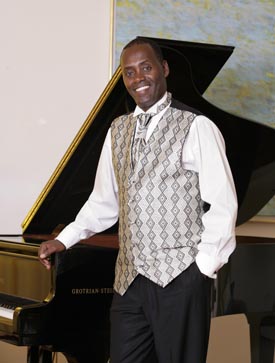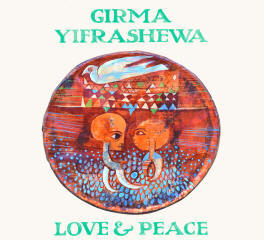Home
Blog
Composers
Musicians
Black History
Audio
About Us
Links
Musicians:
Blanke, John
Bridgetower, George A. P.
Chapman Nyaho, William H.
DePreist, James
Dworkin, Aaron Paul
Freeman, Paul
Johnson, Francis
Machado, Celso
Ngwenyama, Nokuthula
Wiggins, Thomas "Blind Tom"
Yifrashewa, Girma
AfriClassical Blog
Companion to AfriClassical.com
Guest Book
William J. Zick, Webmaster,
wzick@ameritech.net
©
Copyright 2006-2022
William J. Zick
All rights reserved for all content of AfriClassical.com
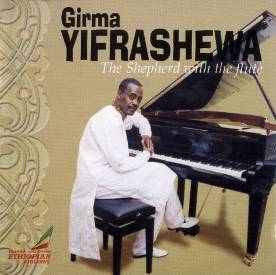
Girma Yifrashewa: The Shepherd with
the flute
(2001)
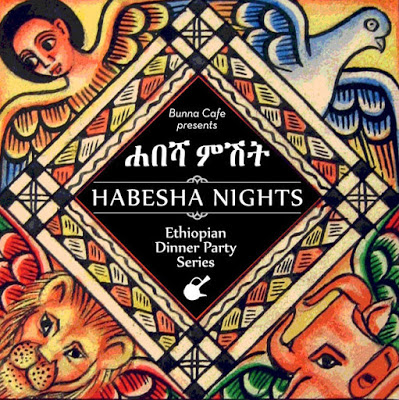
Habesha Nights Ethiopian Dinner Party,
Bunna Cafe, Brooklyn, New York, June, 2013
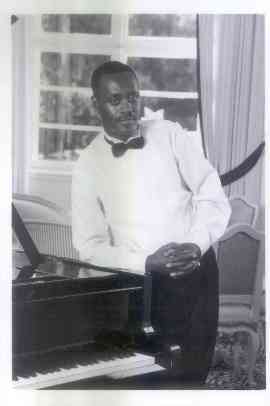
Girma Yifrashewa
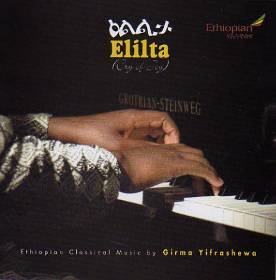
Elilta (Cry of Joy): Ethiopian
Classical Music by Girma Yifrashewa
Elilta (7:06), Ambassel (9:40), Chewata (9:31),
Sememen (9:50), My Strong Will (7:32), The Shepherd with
the Flute (8:50)
Girma Yifrashewa, piano
Doroteya Dimitrova, violin
Lyubomir Nikov, cello
Mikhail Zhivkov, clarinet
Sofia Philharmonic Orchestra
Dian Tchobanov, Conductor
Balkan Multimedia Center (2006) |
Home
-> Musicians -> Yifrashewa, Girma
Français
Girma Yifrashewa (b.
1967)
Ethiopian Classical Pianist & Composer
Bethesda, Maryland Appearance in U.S. on July
30, 2014 is CD Release Party for Love and Peace on Unseen Worlds
Music Label
Audio
Samples: Balkan Multimedia Center (2006); Elilta: Ethiopian Classical Music by
Girma Yifrashewa; Girma Yifrashewa, piano
a Elilta
b Ambassel
c Chewata
d Sememen
e My Strong Will
f The Shepherd with the Flute
1 Birth
The African pianist Girma Yifrashewa has a website at:
http://www.GirmaYifrashewa.com.
Girma was born in Addis Ababa, Ethiopia on Oct. 15, 1967. He is
the first Ethiopian classical pianist to perform widely in Africa.
He has also given concerts many other places,
including Europe and Australia. Married and the father of one child, he
lives in Addis Ababa.
2 First Saw Piano
Girma's bio explains that he played the kirar as a child:
|
Born in
Addis Ababa on 15 October 1967,
Girma learnt to play the Kirar, a harp-like
traditional Ethiopian string instrument, at
a tender age. He was introduced to piano at the age 16,
marking a turn in his
life. |
The online
Addis Tribune reported on May 25, 2001 that Yifrashewa first saw a piano
on the day he began his studies at the renowned Yared Music School in
Addis Ababa:
|
Girma
first saw the piano at the Yared Music School when he
was sixteen. He had just passed the entrance examination
and was about to join the school with only the love and
the ability to play the kirar, the Ethiopian stringed
instrument. "When I saw the grand piano there in the
room at the school I fell in love with it," recalls
Girma. "I never had any other choice. |
3 Scholarship
The bio of the pianist explains the first two phases of his studies in
piano:
|
He
studied at the Yared School of Music
in Addis Ababa for four years and graduated with a
diploma in piano. He then received a five-year bursary
from the Ethiopian government to study at the Sofia
State Conservatory of Music and graduated with a Masters
in Piano. |
4 Solo Pianist
It was in Bulgaria that the young student established himself as a solo
pianist, his bio says:
|
It is
in Bulgaria that he made an impact
as a solo pianist holding shows throughout the country
until his return
to East Africa in 1995. Perhaps his best
show was in the Salabaldini Room in Rome just before
returning to his home
country.
His best achievement as a performer is in the sphere of
romantic and impressionist repertoires, above all the
piano works of Schumann, Schubert and Debussy. He has a
preference and well-determined approach to the music of
Bach as well as to those of Mozart and Beethoven. |
5 Stipend Lost
The fall of the Soviet Union had immediate impact on Yifrashewa's
graduate studies in Bulgaria, as the Addis Tribune relates:
|
His
training in Bulgaria was never a rosy one. In the
middle of his school years at the Conservatory, Girma
saw the collapse of the Soviet Union that was also felt
seriously in Bulgaria. Instantly, the stipend that
they got as students was discontinued and [he] could not
carry on with his drills as he had no access to the
piano. |
6 Return to School
The article explains that Yifrashewa's financial crisis caused him to
leave Bulgaria. He arrived at a train station in Rome, Italy
penniless. An Ethiopian he met there took him in, and soon Yifrashewa found shelter with the Christian Brothers in Rome.
After a short period of manual labor by day and piano practice by night,
financial support from the Christian Brothers enabled Yifrashewa to
return to Sofia to complete his studies. He is quoted as saying:
|
"The
brothers saved me and made me what I am today as I
possibly would have ended up being somebody else," he
notes. He then completed his education at the
Conservatory in good standing. "His performance radiates
a pure and rich mentality, a precious balance between
the emotional and the rational... He manages
to perfect his instrumentalist skills to a degree that
permitted him to play with ease compositions requiring
virtuoso technique," testified Atanas Kourtev, the
professor under whose tutelage Girma perfected his
skills. |
7 Graduate Studies
We learn from Yifrashewa's bio that his graduate studies were made
possible by the governments of Germany and the United Kingdom:
|
Girma
was privileged to have received scholarships for
short-term specialization
courses from the British and German Governments, at the
Royal Academy of Music in London (1997) and at the
Hochschule fur Music Und Theater – Felix Mendelssohn
Bartholdy – in Leipzig (1999), respectively. |
His
teacher in Leipzig was Professor Helgcheide Schmidt.
8 Positions
In his bio Girma also lists the professional positions he has held since
completing his music studies:
|
With
regard to his work experience, on his return to Ethiopia
in 1995, he took up a position with the Yared School of
Music as a piano teacher where he worked until 2001. He
was also working at the Sheraton Addis as a Pianist for
one year (2000-2001). Now Girma is involved in his
private work to promote Ethiopian and Classical Music
throughout
the continent and beyond. On his spare time, he also
gives private piano lessons to students of different age
groups. |
9 Classical CD
Three recordings are mentioned in Yifrashewa's bio, beginning with his
classical release in 2001:
|
Girma
has so far released two albums: the Shepherd with the
Flute (2001) and Meleya Keleme (2003). He has finalized
the recording of his third album “Elilta” and is
planning to release it soon. |
The Addis
Tribune article recounts that the actual recording of the 2001 classical
CD had been done nearly two years earlier, at the Bavaria Studio in
Munich, Germany. Two days were required for the recording, which was
supported by the Germany Embassy. The article notes with pride:
|
In
light of dreams coming true, this CD production of
classical music has therefore, become the first of its
kind ever to be published by an Ethiopian. |
10 Works on First CD
The 2001 CD, The Shepherd with the Flute, includes works of
Beethoven, Chopin, Debussy, Mozart and Schumann, as well as a new work
by the pianist himself. It is called The Shepherd Flutist
(7:14)
and is based on The Shepherd with the Flute, a composition of
Ashenafi Kebede, an Ethiopian composer. The CD is available from In-Flight Services of Ethiopian Airlines.
11 Other Works
Girma Yifrashewa composed and arranged the music for the 2003 popular
music CD Meleya Keleme. Additional examples are found in the
curriculum vitae:
|
2003:
Composed and arranged the music
for the album Meleya Keleme.
April 2004: Composed and arranged the music for the
songs presented during the
second tour in Africa with a vocalist.
Nov. 2004: Composed, arranged, directed and presented a
Children’s Choir
concert under the auspices of the African Child Policy
Forum. |
12 Preparation
Girma's curriculum vitae explains the steps he
took in 2005 to prepare the program of his second classical CD,
Elilta (Cry of Joy):
|
2005: Arranged the Piano piece the Shepherd with the
Flute to be played by
an orchestra and arranged a new piece,
a quartet (Piano, Violin, Cello and Clarinet), entitled
My Strong Will, these two being part of the latest CD,
Elilta, along with 4 other piano compositions of
Ethiopian music presented in the western
classical style. |
13
Centennial Event
The liner notes also tell of a commemorative concert in 2005:
|
In
2005, on the occasion of the celebrations of the 100th
Anniversary of the commencement of Ethio-German
diplomatic relations, Girma was given the unique
opportunity to perform with the German Leipzig Youth
Symphony Orchestra Beethoven's Piano Concerto no. 2 and
Ethiopian music (Girma's own compositions.) The concert
was highly praised both in Germany (Leipzig and Berlin)
and Addis Ababa. |
14
Elilta
The CD Elilta, released in 2006, begins with four works for solo piano:
Elilta (7:06), Ambassel (9:40) Chewata (9:31) and
Sememen (9:50). The liner notes explain the first work:
|
Elilta
is the vocal custom by which Ethiopians express
their deepest joy. It is usually used during happy
occasions like weddings and other joyous social events.
It is also widely used during church festivities.
Elilta, in this album, is an amalgamation of popular
Ethiopian wedding songs and Girma's personal
interpretation of this unique sound on the piano. |
My Strong Will (7:32) is a work for quartet.
The performers are: Girma Yifrashewa, piano; Doroteya Dimitrova, violin;
Lyubomir Nikov, cello; and Mikhail Zhivkov, clarinet. Ventsi
Mitsov orchestrated the final work, The Shepherd with the Flute
(8:50). It is performed by the Sofia Philharmonic Orchestra
under the direction of Dian Tchobanov,Conductor, and is dedicated to the
late Ethiopian composer and Professor Ashenafi Kebede.
15 Tours of Africa
The curriculum vitae of the pianist lists these performances on tour and
in concerts in Africa since 2002:
|
2002:
International solo tour to 11 African countries
(Djibouti, Rwanda, Burundi, Kenya, Uganda, Mauritius, Mozambique, Zimbabwe, Namibia, Lesotho, South Africa
(Cape Town and Port Elizabeth.
2004: International tour with a vocalist to 10 African
countries (Djibouti, Seychelles, South Africa (Port
Elizabeth
and Johannesburg) Lesotho, Zimbabwe (Harare and
Bulawayo), Mozambique, Zambia, Malawi, Burundi, Uganda). |
16 Phoenix Prize
During his unprecedented first concert tour of Africa in February and
March, 2002 the young Ehiopian pianist received a favorable critique
from The Herald newspaper in Harare, Zimbabwe:
|
Girma
successfully explores lyric music with a marked taste
for romantic and impressionist repertoires.
Recently, he received the Phoenix Prize given in honour
of artists contributing to the development of art in
Ethiopia. |
17 Other Travel
The same document describes tours and concerts in Europe and Australia
since 2002:
|
2002
Australia (Melbourne, Ballarat).
2003: Tour in France and Germany to
launch and promote the CD Meleya Keleme (with a
vocalist, a violinist and a cellist)
2005: Concert held in Germany and Ethiopia with the
Leipzig Youth Symphony Orchestra in commemoration the
100th Anniversary of the
commencement of diplomatic relations between Ethiopia
and Germany.
Other concerts held in Bulgaria, Italy, United Kingdom. |
This page was last updated on
March 5, 2022 |





